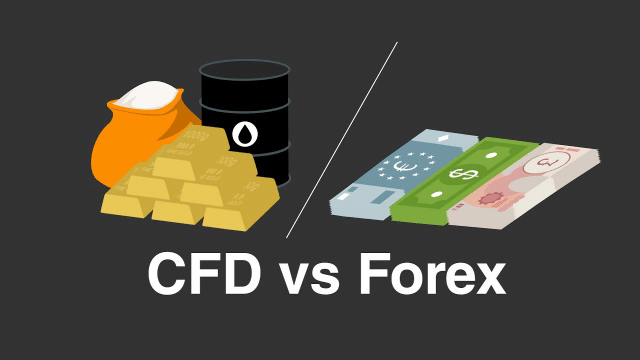Wondering whether to trade with CFDs or just go for simple Forex trading? Read on to understand how the two options differ and choose what suits your investment requirements.
What is a Contract for Differences?
Contract for Differences is an advanced trading strategy. Used by experienced traders, a CFD allows traders to benefit from price differences without actually owning the asset. It is essentially an agreement that pays the differences in the settlement between the closing and open trade prices of financial derivatives. You don’t actually own the physical goods or securities when trading with CFDs. Trading with CFDs is not allowed in the United States. CFDs allow investors to make price bets against the rise or fall of the price of the underlying asset or security.
CFD vs Forex
Some wonder which one out of the two is better – but the right question is what are the differences between them. This will help you analyze which suits your investment needs and long-term financial goals.
- Selection of Instruments
The striking difference between Forex and CFD is that Forex allows trading in pure currency whereas CFD allows you to trade currency along with a variety of assets such as indices, energy, and metals, etc. Forex trading is pretty straightforward whereas with CFD you need to choose the right kind of instruments to trade.
- Size of Contract
While trading forex, the lot size remains steady regardless of the pair of currency you trade – 100,000 units of currency is the standard lot for trading. There are also mini (10,000), micro (1,000) and nano (100) units of currency.
On the other hand, CFD trading provides a range of contract sizes. Formation of one CFD depends on the assets you trade. For example, when you trade equity, one standard contract is one share while with metal, one standard contract is 100 ounces.
- Cost of Trading
Even though the cost of trading CFDs and forex are both partially based on spread, CFDs have a tendency to involve additional costs that may vary with trading conditions and the asset being traded. When CFDs are held overnight, they can attract ‘overnight financing costs’. The cost of trading is spread when forex and commodity CFDs are traded.
- Market Influence
Forex prices are affected by changes in the global macroeconomic and political conditions such as monetary policy expectations, employment shifts and their impact on the GDP of the countries whose currencies are traded. The price changes in the CFD market depend on specific factors that affect the given commodity. This may include factors such as changes in trend related to particular demand and supply of the commodity.
Benefits and Risks with CFD
Pros
Leverage : You only have to deposit a small percentage of the total value you want to trade, known as initial margin. The value of funds deposited is then amplified. For example, If your broker provides a 1:3 leverage for an instrument, for trading $30,000, you only need to pay $3,000.
Liquidity: Usually CFDs offer liquidity and fast execution of orders. You are able to instantly open or close your positions. Traditional stock brokers take time to execute the orders. Through CFD, you have direct access to your capital.
Low Cost of Transaction: Unlike the traditional trading in the stock market, where the broker may charge $8 to open the trade and another $8 while closing the trade – even if you made $2 during the day, you’ll have to pay $16 to the broker; in case of CFDs, you usually won’t be charged a fee for opening positions. Although you’ll still have to pay the ‘spread’.
Cons
Leverage: It is ironic how an advantage can be a drawback. When you use leverage, you increase your exposure and this can lead the profits to both skyrocket or hit rock bottom.
Suppose the market goes against you and the margin falls below the decided level, your broker will ask you to cover that margin or sell your instruments partially or fully. Usually short sellers are exposed to limitless losses because the value of assets can grow cosmically.
Absence of Ownership: When trading CFD instruments, you do not have ownership of the assets bought -you only own the contract, not the currency, share, or commodity. This is fine when it comes to commodities as you don’t need to store them. But when it comes to shares, you will not have the dividends or the voting rights.
Financing Fees: When you keep a CFD position open over a weekend or even overnight, you will be charged a financing fee by the CFD broker. This charge is simply passed on by the broker in order to keep your position open.
Benefits and Risks with Forex
Pros
Liquidity: In terms of volume, the Forex market is the largest in the world. This spells sufficient liquidity in order to trade, especially for the major currencies. The forex market is flexible in the sense that in case liquidity is scarce in certain portions of the market, a brokerage firm may take up the opposite position to flush in much-needed liquidity.
No Central Regulator: Unlike markets where stock, bonds or commodities are traded, the forex market doesn’t have a central regulator. It is not centralized or influenced by any inside information. The people who have inside information are government officials who will face scrutiny if they try to monetize the said information.
Easy Tax Rules: Traders in other markets may have to maintain their short-term or long-term trading activities for filing taxes. But forex trading has simpler tax rules that makes the calculation easier.
Cons
Less Transparency: Being an Over-The-Counter market, trades are not executed over a centralised exchange and there is less supervision. Due to this, as a trader you must research about your broker’s authenticity and trading practices before you commit to them.
Highly Volatile: All types of markets, including forex market, face frequent and unavoidable volatility at some point of time. This is the nature of the market and the market favours the bold who strategize smartly. If you are a trader who is looking for short term profits in the forex market, your trading strategy may not prove to be so profitable.
Conclusion
Whether you choose to trade with Forex or CFD, you must begin by evaluating the capital you possess and the leverage. You must spend time to understand the market environment, your risk appetite, your short-term and long-term financial goals before you start investing. While investing in either markets may profit you, there are certain risks associated with both of them. It is advised to weigh in and make a rational decision to ensure long-term sustainable profits.




